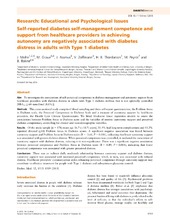| dc.description.abstract | Aim: To investigate the associations of self-perceived competence in diabetes management and autonomy support from healthcare providers with diabetes distress in adults with Type 1 diabetes mellitus that is not optimally controlled [HbA1c ≥ 64 mmol/mol (8.0%)]. Methods: This cross-sectional study comprised blood sampling and three self-report questionnaires, the Problem Areas in Diabetes scale, the Perceived Competence in Diabetes Scale and a measure of autonomy support by healthcare providers, the Health Care Climate Questionnaire. We fitted blockwise linear regression models to assess the associations between Problem Areas in Diabetes score and the variables of interest (autonomy support and perceived diabetes competence), controlling for clinical and sociodemographic variables. Results: Of the study sample [n = 178; mean age 36.7 (±10.7) years], 31.5% had long-term complications and 43.2% reported elevated (≥40) Problem Areas in Diabetes scores. A significant negative association was found between autonomy support and Problem Areas in Diabetes score (B = -3.61, P = 0.001), indicating that lower autonomy support was associated with greater diabetes distress. When perceived competence was controlled, it mediated the association of autonomy support with diabetes distress, reducing it to non-significance. There was a significant negative association between perceived competence and Problem Areas in Diabetes score (B = -8.89, P < 0.001), indicating that lower perceived competence was associated with greater perceived distress. Conclusions: There was an indirect (fully mediated) relationship between autonomy support and diabetes distress; autonomy support was associated with increased perceived competence, which, in turn, was associated with reduced distress. Healthcare providers' communication styles enhancing perceived competence through autonomy support may contribute to effective treatment for people with Type 1 diabetes and suboptimum glycaemic control. | en_US |

